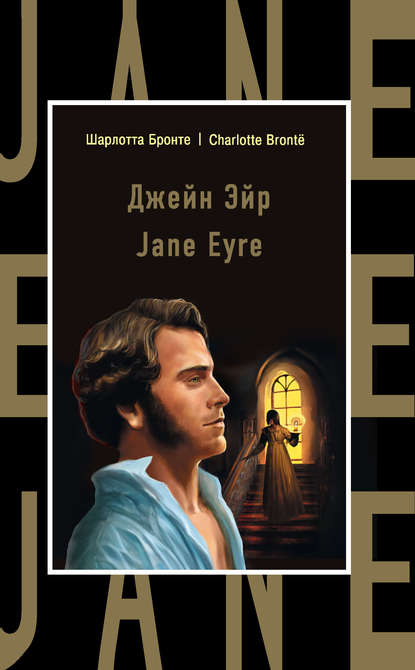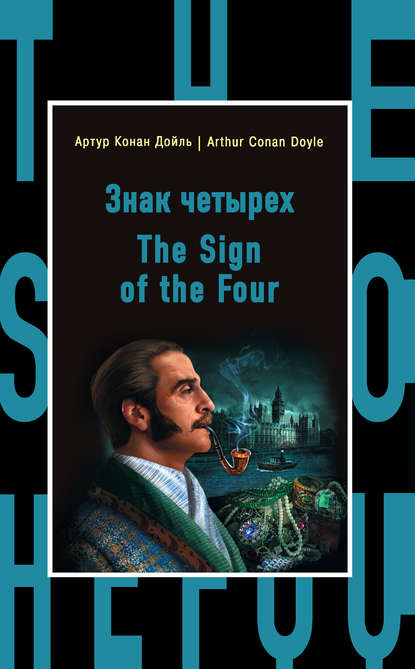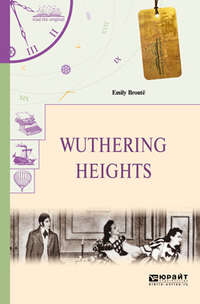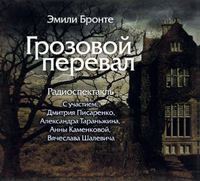
Полная версия
Грозовой перевал / Wuthering Heights
Mr. Hindley had gone from home one afternoon, and Heathcliff presumed to give himself a holiday on the strength of it. He had reached the age of sixteen then, I think, and without having bad features, or being deficient in intellect, he contrived to convey an impression of inward and outward repulsiveness that his present aspect retains no traces of. In the first place, he had by that time lost the benefit of his early education: continual hard work, begun soon and concluded late, had extinguished any curiosity he once possessed in pursuit of knowledge, and any love for books or learning. His childhood’s sense of superiority, instilled into him by the favours of old Mr. Earnshaw, was faded away. He struggled long to keep up an equality with Catherine in her studies, and yielded with poignant though silent regret: but he yielded completely; and there was no prevailing on him to take a step in the way of moving upward, when he found he must, necessarily, sink beneath his former level. Then personal appearance sympathised with mental deterioration: he acquired a slouching gait and ignoble look; his naturally reserved disposition was exaggerated into an almost idiotic excess of unsociable moroseness; and he took a grim pleasure, apparently, in exciting the aversion rather than the esteem of his few acquaintance.
Catherine and he were constant companions still at his seasons of respite from labour; but he had ceased to express his fondness for her in words, and recoiled with angry suspicion from her girlish caresses, as if conscious there could be no gratification in lavishing such marks of affection on him. On the before-named occasion he came into the house to announce his intention of doing nothing, while I was assisting Miss Cathy to arrange her dress: she had not reckoned on his taking it into his head to be idle; and imagining she would have the whole place to herself, she managed, by some means, to inform Mr. Edgar of her brother’s absence, and was then preparing to receive him.
‘Cathy, are you busy this afternoon?’ asked Heathcliff. ‘Are you going anywhere?’
‘No, it is raining,’ she answered.
‘Why have you that silk frock on, then?’ he said. ‘Nobody coming here, I hope?’
‘Not that I know of,’ stammered Miss: ‘but you should be in the field now, Heathcliff. It is an hour past dinnertime: I thought you were gone.’
‘Hindley does not often free us from his accursed presence,’ observed the boy. ‘I’ll not work any more to-day: I’ll stay with you.’
‘Oh, but Joseph will tell,’ she suggested; ‘you’d better go!’
‘Joseph is loading lime on the further side of Penistone Crags; it will take him till dark, and he’ll never know.’
So, saying, he lounged to the fire, and sat down. Catherine reflected an instant, with knitted brows she found it needful to smooth the way for an intrusion. ‘Isabella and Edgar Linton talked of calling this afternoon,’ she said, at the conclusion of a minute’s silence. ‘As it rains, I hardly expect them; but they may come, and if they do, you run the risk of being scolded for no good.’
‘Order Ellen to say you are engaged, Cathy,’ he persisted; ‘don’t turn me out for those pitiful, silly friends of yours! I’m on the point, sometimes, of complaining that they – but I’ll not —’
‘That they what?’ cried Catherine, gazing at him with a troubled countenance. ‘Oh, Nelly!’ she added petulantly, jerking her head away from my hands, ‘you’ve combed my hair quite out of curl! That’s enough; let me alone. What are you on the point of complaining about, Heathcliff?’
‘Nothing – only look at the almanack on that wall;’ he pointed to a framed sheet hanging near the window, and continued, ‘The crosses are for the evenings you have spent with the Lintons, the dots for those spent with me. Do you see? I’ve marked every day.’
‘Yes – very foolish: as if I took notice!’ replied Catherine, in a peevish tone. ‘And where is the sense of that?’
‘To show that I DO take notice,’ said Heathcliff.
‘And should I always be sitting with you?’ she demanded, growing more irritated. ‘What good do I get? What do you talk about? You might be dumb, or a baby, for anything you say to amuse me, or for anything you do, either!’
‘You never told me before that I talked too little, or that you disliked my company, Cathy!’ exclaimed Heathcliff, in much agitation.
‘It’s no company at all, when people know nothing and say nothing,’ she muttered.
Her companion rose up, but he hadn’t time to express his feelings further, for a horse’s feet were heard on the flags, and having knocked gently, young Linton entered, his face brilliant with delight at the unexpected summon she had received. Doubtless Catherine marked the difference between her friends, as one came in and the other went out. The contrast resembled what you see in exchanging a bleak, hilly, coal country for a beautiful fertile valley; and his voice and greeting were as opposite as his aspect. He had a sweet, low manner of speaking, and pronounced his words as you do: that’s less gruff than we talk here, and softer.
‘I’m not come too soon, am I?’ he said, casting a look at me: I had begun to wipe the plate, and tidy some drawers at the far end in the dresser.
‘No,’ answered Catherine. ‘What are you doing there, Nelly?’
‘My work, Miss,’ I replied. (Mr. Hindley had given me directions to make a third party in any private visits Linton chose to pay.)
She stepped behind me and whispered crossly, ‘Take yourself and your dusters off; when company are in the house, servants don’t commence scouring and cleaning in the room where they are!’
‘It’s a good opportunity, now that master is away,’ I answered aloud: ‘he hates me to be fidgeting over these things in his presence. I’m sure Mr. Edgar will excuse me.’
‘I hate you to be fidgeting in MY presence,’ exclaimed the young lady imperiously, not allowing her guest time to speak: she had failed to recover her equanimity since the little dispute with Heathcliff.
‘I’m sorry for it, Miss Catherine,’ was my response; and I proceeded assiduously with my occupation.
She, supposing Edgar could not see her, snatched the cloth from my hand, and pinched me, with a prolonged wrench, very spitefully on the arm. I’ve said I did not love her, and rather relished mortifying her vanity now and then: besides, she hurt me extremely; so I started up from my knees, and screamed out, ‘Oh, Miss, that’s a nasty trick! You have no right to nip me, and I’m not going to bear it.’
‘I didn’t touch you, you lying creature!’ cried she, her fingers tingling to repeat the act, and her ears red with rage. She never had power to conceal her passion, it always set her whole complexion in a blaze.
‘What’s that, then?’ I retorted, showing a decided purple witness to refute her.
She stamped her foot, wavered a moment, and then, irresistibly impelled by the naughty spirit within her, slapped me on the cheek: a stinging blow that filled both eyes with water.
‘Catherine, love! Catherine!’ interposed Linton, greatly shocked at the double fault of falsehood and violence which his idol had committed.
‘Leave the room, Ellen!’ she repeated, trembling all over.
Little Hareton, who followed me everywhere, and was sitting near me on the floor, at seeing my tears commenced crying himself, and sobbed out complaints against ‘wicked aunt Cathy,’ which drew her fury on to his unlucky head: she seized his shoulders, and shook him till the poor child waxed livid, and Edgar thoughtlessly laid hold of her hands to deliver him. In an instant one was wrung free, and the astonished young man felt it applied over his own ear in a way that could not be mistaken for jest. He drew back in consternation. I lifted Hareton in my arms, and walked off to the kitchen with him, leaving the door of communication open, for I was curious to watch how they would settle their disagreement. The insulted visitor moved to the spot where he had laid his hat, pale and with a quivering lip.
‘That’s right!’ I said to myself. ‘Take warning and begone! It’s a kindness to let you have a glimpse of her genuine disposition.’
‘Where are you going?’ demanded Catherine, advancing to the door.
He swerved aside, and attempted to pass.
‘You must not go!’ she exclaimed, energetically.
‘I must and shall!’ he replied in a subdued voice.
‘No,’ she persisted, grasping the handle; ‘not yet, Edgar Linton: sit down; you shall not leave me in that temper. I should be miserable all night, and I won’t be miserable for you!’
‘Can I stay after you have struck me?’ asked Linton.
Catherine was mute.
‘You’ve made me afraid and ashamed of you,’ he continued; ‘I’ll not come here again!’
Her eyes began to glisten and her lids to twinkle.
‘And you told a deliberate untruth!’ he said.
‘I didn’t!’ she cried, recovering her speech; ‘I did nothing deliberately. Well, go, if you please – get away! And now I’ll cry, I’ll cry myself sick!’
She dropped down on her knees by a chair, and set to weeping in serious earnest. Edgar persevered in his resolution as far as the court; there he lingered. I resolved to encourage him.
‘Miss is dreadfully wayward, sir,’ I called out. ‘As bad as any marred child: you’d better be riding home, or else she will be sick, only to grieve us.’
The soft thing looked askance through the window: he possessed the power to depart as much as a cat possesses the power to leave a mouse half killed, or a bird half eaten. Ah, I thought, there will be no saving him: he’s doomed, and flies to his fate! And so it was: he turned abruptly, hastened into the house again, shut the door behind him; and when I went in a while after to inform them that Earnshaw had come home rabid drunk, ready to pull the whole place about our ears (his ordinary frame of mind in that condition), I saw the quarrel had merely effected a closer intimacy had broken the outworks of youthful timidity, and enabled them to forsake the disguise of friendship, and confess themselves lovers.
Intelligence of Mr. Hindley’s arrival drove Linton speedily to his horse, and Catherine to her chamber. I went to hide little Hareton, and to take the shot out of the master’s fowling-piece, which he was fond of playing with in his insane excitement, to the hazard of the lives of any who provoked, or even attracted his notice too much; and I had hit upon the plan of removing it, that he might do less mischief if he did go the length of firing the gun.
Chapter IX
He entered, vociferating oaths dreadful to hear; and caught me in the act of stowing his son sway in the kitchen cupboard. Hareton was impressed with a wholesome terror of encountering either his wild beast’s fondness or his madman’s rage; for in one he ran a chance of being squeezed and kissed to death, and in the other of being flung into the fire, or dashed against the wall; and the poor thing remained perfectly quiet wherever I chose to put him.
‘There, I’ve found it out at last!’ cried Hindley, pulling me back by the skin of my neck, like a dog. ‘By heaven and hell, you’ve sworn between you to murder that child! I know how it is, now, that he is always out of my way. But, with the help of Satan, I shall make you swallow the carving-knife, Nelly! You needn’t laugh; for I’ve just crammed Kenneth, head-downmost, in the Blackhorse marsh; and two is the same as one and I want to kill some of you: I shall have no rest till I do!’
‘But I don’t like the carving-knife, Mr. Hindley,’ I answered; ‘it has been cutting red herrings. I’d rather be shot, if you please.’
‘You’d rather be damned!’ he said; ‘and so you shall. No law in England can hinder a man from keeping his house decent, and mine’s abominable! Open your mouth.’ He held the knife in his hand, and pushed its point between my teeth: but, for my part, I was never much afraid of his vagaries. I spat out, and affirmed it tasted detestably – I would not take it on any account.
‘Oh!’ said he, releasing me, ‘I see that hideous little villain is not Hareton: I beg your pardon, Nell. If it be, he deserves flaying alive for not running to welcome me, and for screaming as if I were a goblin. Unnatural cub, come hither! I’ll teach thee to impose on a good-hearted, deluded father. Now, don’t you think the lad would be handsomer cropped? It makes a dog fiercer, and I love something fierce – get me a scissors – something – fierce and trim! Besides, it’s infernal affectation devilish conceit it is, to cherish our ears we’re asses enough without them. Hush, child, hush! Well then, it is my darling! wisht, dry thy eyes there’s a joy; kiss me. What! it won’t? Kiss me, Hareton! Damn thee, kiss me! By God, as if I would rear such a monster! As sure as I’m living, I’ll break the brat’s neck.’
Poor Hareton was squalling and kicking in his father’s arms with all his might, and redoubled his yells when he carried him upstairs and lifted him over the banister. I cried out that he would frighten the child into fits, and ran to rescue him. As I reached them, Hindley leant forward on the rails to listen to a noise below; almost forgetting what he had in his hands. ‘Who is that?’ he asked, hearing some one approaching the stairs’-foot. I leant forward also, for the purpose of signing to Heathcliff, whose step I recognised, not to come further; and, at the instant when my eye quitted Hareton, he gave a sudden spring, delivered himself from the careless grasp that held him, and fell.
There was scarcely time to experience a thrill of horror before we saw that the little wretch was safe. Heathcliff arrived underneath just at the critical moment; by a natural impulse he arrested his descent, and setting him on his feet, looked up to discover the author of the accident. A miser who has parted with a lucky lottery ticket for five shillings, and finds next day he has lost in the bargain five thousand pounds, could not show a blanker countenance than he did on beholding the figure of Mr. Earnshaw above. It expressed, plainer than words could do, the intensest anguish at having made himself the instrument of thwarting his own revenge. Had it been dark, I daresay he would have tried to remedy the mistake by smashing Hareton’s skull on the steps; but, we witnessed his salvation; and I was presently below with my precious charge pressed to my heart. Hindley descended more leisurely, sobered and abashed.
‘It is your fault, Ellen,’ he said; ‘you should have kept him out of sight: you should have taken him from me! Is he injured anywhere?’
‘Injured!’ I cried angrily; ‘if he is not killed, he’ll be an idiot! Oh! I wonder his mother does not rise from her grave to see how you use him. You’re worse than a heathen treating your own flesh and blood in that manner!’ He attempted to touch the child, who, on finding himself with me, sobbed off his terror directly. At the first finger his father laid on him, however, he shrieked again louder than before, and struggled as if he would go into convulsions.
‘You shall not meddle with him!’ I continued. ‘He hates you, they all hate you, that’s the truth! A happy family you have; and a pretty state you’re come to!’
‘I shall come to a prettier, yet, Nelly,’ laughed the misguided man, recovering his hardness. ‘At present, convey yourself and him away. And hark you, Heathcliff! clear you too quite from my reach and hearing. I wouldn’t murder you to-night; unless, perhaps, I set the house on fire: but that’s as my fancy goes.’
While saying this he took a pint bottle of brandy from the dresser, and poured some into a tumbler.
‘Nay, don’t!’ I entreated. ‘Mr. Hindley, do take warning. Have mercy on this unfortunate boy, if you care nothing for yourself!’
‘Any one will do better for him than I shall,’ he answered.
‘Have mercy on your own soul!’ I said, endeavouring to snatch the glass from his hand.
‘Not I! On the contrary, I shall have great pleasure in sending it to perdition to punish its Maker,’ exclaimed the blasphemer. ‘Here’s to its hearty damnation!’
He drank the spirits and impatiently bade us go; terminating his command with a sequel of horrid imprecations too bad to repeat or remember.
‘It’s a pity he cannot kill himself with drink,’ observed Heathcliff, muttering an echo of curses back when the door was shut. ‘He’s doing his very utmost; but his constitution defies him. Mr. Kenneth says he would wager his mare that he’ll outlive any man on this side Gimmerton, and go to the grave a hoary sinner; unless some happy chance out of the common course befall him.’
I went into the kitchen, and sat down to lull my little lamb to sleep. Heathcliff, as I thought, walked through to the barn. It turned out afterwards that he only got as far as the other side the settle, when he flung himself on a bench by the wall, removed from the fire and remained silent.
I was rocking Hareton on my knee, and humming a song that began, —
It was far in the night, and the bairnies grat,The mither beneath the mools heard that,[31]when Miss Cathy, who had listened to the hubbub from her room, put her head in, and whispered, ‘Are you alone, Nelly?’
‘Yes, Miss,’ I replied.
She entered and approached the hearth. I, supposing she was going to say something, looked up. The expression of her face seemed disturbed and anxious. Her lips were half asunder, as if she meant to speak, and she drew a breath; but it escaped in a sigh instead of a sentence. I resumed my song; not having forgotten her recent behaviour.
‘Where’s Heathcliff?’ she said, interrupting me.
‘About his work in the stable,’ was my answer.
He did not contradict me; perhaps he had fallen into a doze. There followed another long pause, during which I perceived a drop or two trickle from Catherine’s cheek to the flags. Is she sorry for her shameful conduct? I asked myself. That will be a novelty: but she may come to the point as she will I sha’n’t help her! No, she felt small trouble regarding any subject, save her own concerns.
‘Oh, dear!’ she cried at last. ‘I’m very unhappy!’
‘A pity,’ observed I. ‘You’re hard to please; so many friends and so few cares, and can’t make yourself content!’
‘Nelly, will you keep a secret for me?’ she pursued, kneeling down by me, and lifting her winsome eyes to my face with that sort of look which turns off bad temper, even when one has all the right in the world to indulge it.
‘Is it worth keeping?’ I inquired, less sulkily.
‘Yes, and it worries me, and I must let it out! I want to know what I should do. To-day, Edgar Linton has asked me to marry him, and I’ve given him an answer. Now, before I tell you whether it was a consent or denial, you tell me which it ought to have been.’
‘Really, Miss Catherine, how can I know?’ I replied. ‘To be sure, considering the exhibition you performed in his presence this afternoon, I might say it would be wise to refuse him: since he asked you after that, he must either be hopelessly stupid or a venturesome fool.’
‘If you talk so, I won’t tell you any more,’ she returned, peevishly rising to her feet. ‘I accepted him, Nelly. Be quick, and say whether I was wrong!’
‘You accepted him! Then what good is it discussing the matter? You have pledged your word, and cannot retract.’
‘But say whether I should have done so, do!’ she exclaimed in an irritated tone; chafing her hands together, and frowning.
‘There are many things to be considered before that question can be answered properly,’ I said, sententiously. ‘First and foremost, do you love Mr. Edgar?’
‘Who can help it? Of course I do,’ she answered.
Then I put her through the following catechism: for a girl of twenty-two it was not injudicious.
‘Why do you love him, Miss Cathy?’
‘Nonsense, I do, that’s sufficient.’
‘By no means; you must say why?’
‘Well, because he is handsome, and pleasant to be with.’
‘Bad!’ was my commentary.
‘And because he is young and cheerful.’
‘Bad, still.’
‘And because he loves me.’
‘Indifferent, coming there.’
‘And he will be rich, and I shall like to be the greatest woman of the neighbourhood, and I shall be proud of having such a husband.’
‘Worst of all. And now, say how you love him?’
‘As everybody loves. You’re silly, Nelly.’
‘Not at all. Answer.’
‘I love the ground under his feet, and the air over his head, and everything he touches, and every word he says. I love all his looks, and all his actions, and him entirely and altogether. There now!’
‘And why?’
‘Nay; you are making a jest of it: it is exceedingly ill-natured! It’s no jest to me!’ said the young lady, scowling, and turning her face to the fire.
‘I’m very far from jesting, Miss Catherine,’ I replied. ‘You love Mr. Edgar because he is handsome, and young, and cheerful, and rich, and loves you. The last, however, goes for nothing: you would love him without that, probably; and with it you wouldn’t, unless he possessed the four former attractions.’
‘No, to be sure not: I should only pity him – hate him, perhaps, if he were ugly, and a clown.’
‘But there are several other handsome, rich young men in the world: handsomer, possibly, and richer than he is. What should hinder you from loving them?’
‘If there be any, they are out of my way: I’ve seen none like Edgar.’
‘You may see some; and he won’t always be handsome, and young, and may not always be rich.’
‘He is now; and I have only to do with the present. I wish you would speak rationally.’
‘Well, that settles it: if you have only to do with the present, marry Mr. Linton.’
‘I don’t want your permission for that. I SHALL marry him: and yet you have not told me whether I’m right.’
‘Perfectly right; if people be right to marry only for the present. And now, let us hear what you are unhappy about. Your brother will be pleased; the old lady and gentleman will not object, I think; you will escape from a disorderly, comfortless home into a wealthy, respectable one; and you love Edgar, and Edgar loves you. All seems smooth and easy: where is the obstacle?’
‘HERE! and HERE!’ replied Catherine, striking one hand on her forehead, and the other on her breast: ‘in whichever place the soul lives. In my soul and in my heart, I’m convinced I’m wrong!’
‘That’s very strange! I cannot make it out.’
‘It’s my secret. But if you will not mock at me, I’ll explain it: I can’t do it distinctly; but I’ll give you a feeling of how I feel.’
She seated herself by me again: her countenance grew sadder and graver, and her clasped hands trembled.
‘Nelly, do you never dream queer dreams?’ she said, suddenly, after some minutes’ reflection.
‘Yes, now and then,’ I answered.
‘And so do I. I’ve dreamt in my life dreams that have stayed with me ever after, and changed my ideas: they’ve gone through and through me, like wine through water, and altered the colour of my mind. And this is one: I’m going to tell it, but take care not to smile at any part of it.’
‘Oh! don’t, Miss Catherine!’ I cried. ‘We’re dismal enough without conjuring up ghosts and visions to perplex us. Come, come, be merry and like yourself! Look at little Hareton! HE’S dreaming nothing dreary. How sweetly he smiles in his sleep!’
‘Yes; and how sweetly his father curses in his solitude! You remember him, I daresay, when he was just such another as that chubby thing: nearly as young and innocent. However, Nelly, I shall oblige you to listen: it’s not long; and I’ve no power to be merry to-night.’
‘I won’t hear it, I won’t hear it!’ I repeated, hastily.
I was superstitious about dreams then, and am still; and Catherine had an unusual gloom in her aspect, that made me dread something from which I might shape a prophecy, and foresee a fearful catastrophe. She was vexed, but she did not proceed. Apparently taking up another subject, she recommenced in a short time.
‘If I were in heaven, Nelly, I should be extremely miserable.’
‘Because you are not fit to go there,’ I answered. ‘All sinners would be miserable in heaven.’
‘But it is not for that. I dreamt once that I was there.’
‘I tell you I won’t hearken to your dreams, Miss Catherine! I’ll go to bed,’ I interrupted again.
She laughed, and held me down; for I made a motion to leave my chair.
‘This is nothing,’ cried she: ‘I was only going to say that heaven did not seem to be my home; and I broke my heart with weeping to come back to earth; and the angels were so angry that they flung me out into the middle of the heath on the top of Wuthering Heights; where I woke sobbing for joy. That will do to explain my secret, as well as the other. I’ve no more business to marry Edgar Linton than I have to be in heaven; and if the wicked man in there had not brought Heathcliff so low, I shouldn’t have thought of it. It would degrade me to marry Heathcliff now; so he shall never know how I love him: and that not because he’s handsome, Nelly, but because he’s more myself than I am. Whatever our souls are made of, his and mine are the same; and Linton’s is as different as a moonbeam from lightning, or frost from fire.’














